短文听写
- 格式:docx
- 大小:484.91 KB
- 文档页数:13
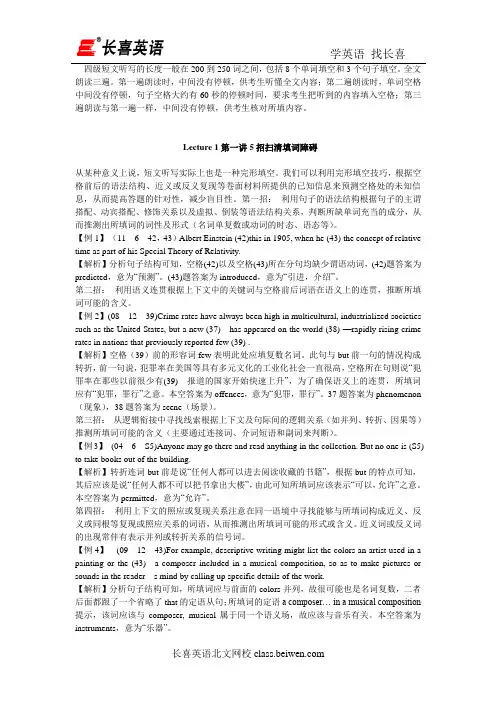
四级短文听写的长度一般在200到250词之间,包括8个单词填空和3个句子填空。
全文朗读三遍。
第一遍朗读时,中间没有停顿,供考生听懂全文内容;第二遍朗读时,单词空格中间没有停顿,句子空格大约有60秒的停顿时间,要求考生把听到的内容填入空格;第三遍朗读与第一遍一样,中间没有停顿,供考生核对所填内容。
Lecture 1第一讲5招扫清填词障碍从某种意义上说,短文听写实际上也是一种完形填空。
我们可以利用完形填空技巧,根据空格前后的语法结构、近义或反义复现等卷面材料所提供的已知信息来预测空格处的未知信息,从而提高答题的针对性,减少盲目性。
第一招:利用句子的语法结构根据句子的主谓搭配、动宾搭配、修饰关系以及虚拟、倒装等语法结构关系,判断所缺单词充当的成分,从而推测出所填词的词性及形式(名词单复数或动词的时态、语态等)。
【例1】(11 6 42,43)Albert Einstein (42)this in 1905, when he (43) the concept of relative time as part of his Special Theory of Relativity.【解析】分析句子结构可知,空格(42)以及空格(43)所在分句均缺少谓语动词,(42)题答案为predicted,意为“预测”。
(43)题答案为introduced,意为“引进,介绍”。
第二招:利用语义连贯根据上下文中的关键词与空格前后词语在语义上的连贯,推断所填词可能的含义。
【例2】(08 12 39)Crime rates have always been high in multicultural, industrialized societies such as the United States, but a new (37) has appeared on the world (38) —rapidly rising crime rates in nations that previously reported few (39) .【解析】空格(39)前的形容词few表明此处应填复数名词。
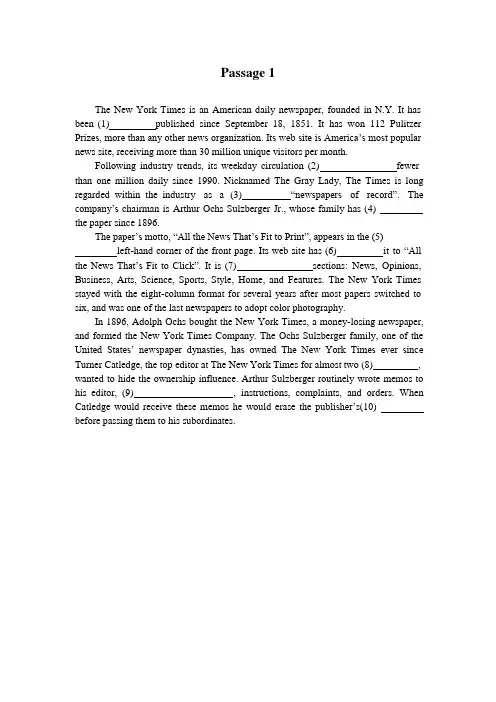
The New York Times is an American daily newspaper, founded in N.Y. It has been (1) published since September 18, 1851. It has won 112 Pulitzer Prizes, more than any other news organization. Its web site is America’s most popular news site, receiving more than 30 million unique visitors per month.Following industry trends, its weekday circulation (2) fewer than one million daily since 1990. Nicknamed The Gray Lady, The Times is long regarded within the industry as a (3) “newspapers of record”. The company’s chairman is Arthur Ochs Sulzberger Jr., whose family has (4)the paper since 1896.The paper’s motto, “All the News That’s Fit to Print”, appears in the (5) left-hand corner of the front page. Its web site has (6) it to “All the News That’s Fit to Click”.It is (7) sections: News, Opinions, Business, Arts, Science, Sports, Style, Home, and Features. The New York Times stayed with the eight-column format for several years after most papers switched to six, and was one of the last newspapers to adopt color photography.In 1896, Adolph Ochs bought the New York Times, a money-losing newspaper, and formed the New York Times Company. The Ochs Sulzberger family, one of the United States’ newspaper dynasties, has owned The New York Times ever since Turner Catledge, the top editor at The New York Times for almost two (8) , wanted to hide the ownership influence. Arthur Sulzberger routinely wrote memos to his editor, (9) , instructions, complaints, and orders. When Catledge would receive these memos he would erase the publisher’s(10)before passing them to his subordinates.Some of the arguments against bike share are just confusing. I don’t know how to (1) the argument that we don’t need bike share because everyone who wants to bike already owns a bike. That’s like saying that we don’t need restaurants because everybody has a (2) . I don’t know what to do with the argument that bike share stations take up valuable space on a public street. You know what is also taking up valuable space on a public street? Your car. My car.Now there are things I don’t love about bike share. I’m not (3) about the idea of more people riding bikes with no helmets, which is probably because a few times I (4) a bike at high speed, hitting my head and cracking my helmet. Walking away with a cracked bike helmet makes you a very (5) fan of bike helmets.And I also think cyclists need to (6) . More than ever I am not going to lie: my first 10 years in New York City I probably stopped at four red lights. These days, however, you come to intersections and you find a half-dozen people stopped at a red light. That kind of peer (7) is both strange and unbelievable. I think cyclists need to think of themselves as part of a bigger (8) picture. But I think this is working. I think the more people that are on bikes, the safer streets become for everyone, and statistics (9) — risk of serious injury (10) for both cyclists and walkers.Women are half the world’s population. But they can face (1) to economic independence and security. Today we hear about a program aimed at (2) low cost loans to women in India. We also examine the Roman Catholic (3)about efforts to permit church women. But first, we learn about women peacekeepers in the Middle East.Along the border of Israel and Lebanon, female peacekeeping troops are active in the United Nations force that guards the area. Avi Arditti tells us more. The captain is a medical (4) and one of about 30 women who live on this French base of 700 peacekeepers. They help to keep the border secure and (5) the Lebanese government. Captain Annie, French soldiers don’t use their last names, says she does not (6) herself a ‘female’ peacekeeper, but a member of the UN force. But she says being a woman does sometimes help.United Nations Interim Force In Lebanon (UNIFIL) has a peacekeeping force of more than 11,000 troops in southern Lebanon. They come from 37 countries. In recent years, the United Nations has begun expanding women (7) . Women in UNIFIL serve on both the common man and military forces, form helping with military planning to teaching French to Lebanese school children. Male and female peacekeepers live together, work together and play sports together. Force commander Eric of the French corps says women help to bring security to an insecure area. In southern Lebanon, many people (8) about the roles of the sexes. But, UNIFIL’s female peacekeepers say they (9) with the local community — men and women (10) .Until the nineteen sixties, black people in many parts of the United States did not have the same civil rights as white people. Laws in the American South kept the two (1) separate. These laws forced black people to (2) separate schools, and sit in separate areas on a bus. One day an old black woman got on a city bus. The law (3) black people seated in one area of the bus to give up their seats to white people. The woman refused to do this and was (4) .This act of peaceful disobedience started (5) in Montgomery that led to legal changes in (6) rights in the United States. The woman who started it was Rosa Parks. She worked (7) clothes from the nineteen thirties until 1955. Then she became a (8) for millions of African-Americans.In much of the American South in the 1950s, the first rows of seats were for white people only. Black people sat in the back of the bus. However, black people sitting in that part (9) leave their seats if a white person wanted it.Rosa Parks and three other black people were seated in the middle area of the bus when a white person got on the bus and wanted a seat. The bus driver (10) that all four black people get out of their seats so the white person would not have to sit next to any of them. The three other blacks got up, but Missus Parks refused. She was arrested.Cecil Blount DeMille was born in Ashfield, Massachusetts. Both his parents were writers of plays. His father died when he was twelve years old. His mother kept the family together by (1) a theater company. Cecil joined the company as an actor. He continued working in his mother’s theater company as an actor and a manager until 1913.That year, he joined Jesse L. Lasky and Samuel Goldfish to (2) the Jesse L. Lasky Feature Play Company. Goldfish later changed his name to Samuel Goldwyn. The three men started making motion pictures (3) . They were (4) interested in its creative and financial possibilities. DeMille, Lasky and Goldfish began working on a movie (5) of the popular American western play “Squaw Man”.DeMille (6) that the movie be made in the real American West. He chose Flagstaff, Arizona. DeMille and the company traveled to Flagstaff by train. When they arrived, DeMille thought the area looked too modern. They were in a quiet little town in southern California. The town was called Hollywood. DeMille decided this was the (7) place to film the movie.“Squaw Man” was one of the first (8) produced in Hollywood. It was released in 1913 and was (9) . DeMille is considered the man who helped Hollywood become the center of the motion picture business. He quickly became a creative force in the new movie industry. Cecil was among the very few filmmakers in Hollywood whose name appeared above the title of his movie. His name was more important to movie-goers than the names of the stars and his movies were known to be big (10) .In the beginning of the twentieth century, women like Isadora Duncan and Ruth Saint Denis wanted to create a new form of dance. Duncan and Saint Denis felt (1) by ballet.Martha Graham was one of the most famous dancers and creators of dance, called choreographers( 编舞者). She brought modern dance to a new level of (2) in American culture. She created a new language of movement that expressed powerful emotions. She started traditions that are still used in modern dance today. They include expressive movements of the body to tell a (3)story, special music, lighting, stage design and (4) .Martha Graham was born in the small town of Allegheny, Pennsylvania in 1894. After Martha turned fourteen years old, her family moved to Santa Barbara, California. While (5) the Midwest, Martha enjoyed the wide, open spaces of nature. She also enjoyed the beautiful flowers and plants in California. The free, expressive movements of modern dance were (6)the beauty of nature Graham observed.Earlier in her life, however, Martha did not know that she would become a dancer. Her father was a doctor and her family was very (7) . They were members of (8) and did not accept dance as an art (9) .Still, in 1910, Martha’s father took her to see a dance (10)by Ruth Saint Denis, one of the first modern dancers in America. Martha was sixteen and she decided then that she wanted to become a dancer.Are manners dead? Cell phones and social networking may be killing off the traditional politeness and good (1) ,but a new generation of etiquette( 礼节) experts is rising to make old-fashioned manners (2) to a new generation. Their goal: to help young people (3) troublesome, tech-age minefields, like invites on social networking sites and online dating, not to mention actual face-to-face (4) with people.Perhaps the fastest growing area of social advice is what’s been termed “netiquette”. There are online (5) on using emotions in business e-mails, being careful when posting on social networks and re-posting too many micro blog messages.Young people “are (6) the irony and rudeness that is so popular in their online lives”, said Jane Pratt, editor in chief of XoJane, a women’s lifestyle web site. “The return of etiquette is in part a response to the harshness of the interactions they are having in the digital sphere.” The social puzzlement seems to be (7) . Are you required to respond to party invitations on Sina Weibo? Is it rude to listen to your iPod while (8) with someone else?When Daniel Post Senning, the great grandson of Emily Post, a well-known etiquette writer in the US, was working on the 18th edition of Emily Post’s Eti quette, he found it impossible to cover technology in (9) . Instead, he (10) an entire book to it, Emily Post’s Manners in a Digital World: Living Well Online.It’s called “Shanghai’s 3rd Annual Love and Marriage Expo”. But the (1) at this vast gathering for single Chinese men and women was (2)unromantic. More than 18,000 people preregistered for the weekend event, (3) in an expanding shopping complex specializing in home and office (4) .The crowds were met by billboards (5) thousands of single men and women — one list in pink and the other in blue. Within minutes of the doors opening on a rainy Saturday morning, visitors hurried to study the lists and take in (6) information about potential candidates — age, height, education, annual income and their registered hometown, also known as hukou.Some people took notes, while others took photos of single entries with their cell phones. In one hall more than a hundred men and women in their twenties and thirties sat (7) each other at tables decorated with red and yellow tablecloths, the beautiful tones of a Norah Jones love song (8)from loudspeakers. “Welcome everybody to our 8-minute (9) ,” announced the master of ceremonies eventually. When the eight minutes was up, each dater was instructed to move on.” Male guests please move two seats to your left,” boomed the announcer. For some (10) , this was the first time they had ever been on a date. “It’s useful … it’s just like research,” said Yixin Bai, a 20-year- old man home for the summer holidays from a university in Canada.Mom always told us we’d go blind if we read in the dark. Does science (1) ? Jim Sheedy, a doctor of vision science and director of the Vision Performance Institute at Oregon’s Pacific University, sets his sights on the (2) . Turns out, our parents were wrong. “There is no reason to believe nor evidence to support that any long-term damage to the eyes or change to the eyes can be caused by reading in the dark,” Dr. Sheedy says. That is not to say that page- turning during the night won’t lead to discomfort or (3) .The lack of light will cause the pupils( 瞳孔) get wilder and opener, (4)a smaller depth of field — the distance between the nearest and(5) object that the eye considers to be in focus. Dr. Sheedy says the added effort to change focus and the effort to change the angle of the lines of sight between the two eyes will (6) make your eyes feel tired and your body spent.But, of course, that’s often the object of reading (7) . Dr. Sheedy says he (8) his students that there isn’t enough evidence to argue that what you do with your eyes leads to nearsightedness. No link to long-term damage has ever been conclusively (9) , says Dr. Sheedy. It’s an old tale, a (10) used by moms to get kids to go to sleep when they wanted them to, he says.Children’s Day is recognized on various days in many places around the world, to honor children globally. It was first (1) by the World Conference for the Well-being of Children in 1925 and then established universally in 1954 to protect children working long hours (2) and allow all children access to an education. The UN General Assembly recommended that all countries should establish a Universal Children’s Day on an (3) “” day.International Day for Protection of Children, (4) in many countries as Children’s Day on June 1 since 1950, was established by the Women’s International Democratic Federation on its (5) in Moscow (22 Novemberthe former Soviet Union’s “peace 1949) and was (6)propaganda” policy.In the West, the whole country celebrates with cards, presents, special foods, parades, and other activities. Although schools (7) open, children do not attend class and (8) homework. Students (9) in a wide variety of activities to strengthen loyalty to their country, have fun, and take part in, and join youth organizations such as the Communist Youth League. Children’s Day is a time of celebration for Chinese youngsters. The occasion is marked by the Children’s Day Celebration honoring (10) students and by numerous parent-children activities sponsored by government and civic organizations. Thus, the day not only lets the kids become king for a day, but also helps to strengthen the bond between parents and their children.短文听写答案(1-10 篇)Passage 1(1) continuously (2) has dropped to (3) national(4) controlled (5) upper (6) adapted(7) organized into (8) decades (9) each containing suggestions (10) identityPassage 2(1) handle (2) kitchen (3) crazy(4) have fallen off (5) loyal (6) behave themselves(7) pressure (8) transportation (9) bear that out(10) declinesPassage 3(1) barriers (2) providing (3) debate(4) specialist (5) assist (6) consider(8) hold conservative ideas (9) get along well(7) in greater numbers(10) alikePassage 4(1) races (2) attend (3) required(4) put in prison (5) protests (6) minority(7) sewing (8) representative of freedom (9) were expected to (10) demanded(1) establishing (2) form (3) without delay(4) deeply (5) version (6) urged(7) perfect (8) full-length works (9) an immediate success (10) productionsPassage 6(1) restricted (2) popularity (3) dramatic(4) costumes (5) traveling across (6) clearly influenced by (7) religious (8) the upper class (9) form(10) performancePassage 7(1) graces (2) relevant (3) handle(4) contact (5) guidelines (6) getting sick of (7) endless (8) sharing a ride (9) a single chapter (10) devotedPassage 8(1) atmosphere (2) decidedly (3) located(4) furniture (5) posting lists of (6) vital(7) facing (8) spilling out (9) speed-dating event (10) participantsPassage 9(1) back her up (2) truth (3) fatigue(4) resulting in (5) farthest (6) likely(7) under the cover (8) assures (9) shown(10) method(1) proclaimed (2) in dangerous circumstances (3) appropriate (4) observed (5) congress (6) strongly bound to(8) are free of (9) participate (7) remain(10) model。
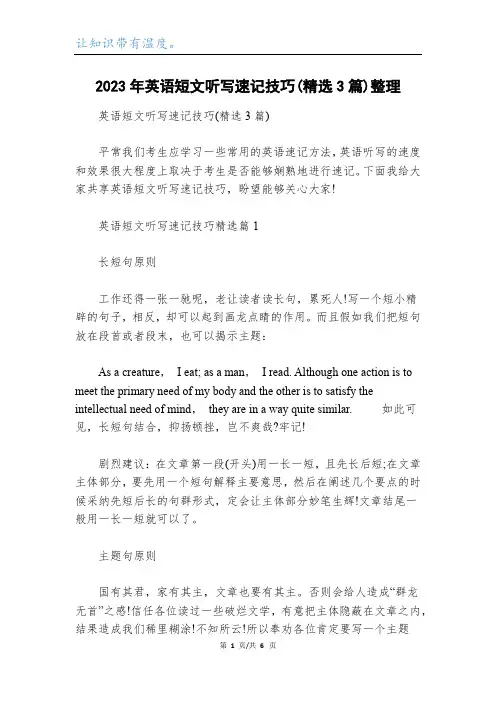
2023年英语短文听写速记技巧(精选3篇)整理英语短文听写速记技巧(精选3篇)平常我们考生应学习一些常用的英语速记方法,英语听写的速度和效果很大程度上取决于考生是否能够娴熟地进行速记。
下面我给大家共享英语短文听写速记技巧,盼望能够关心大家!英语短文听写速记技巧精选篇1长短句原则工作还得一张一驰呢,老让读者读长句,累死人!写一个短小精辟的句子,相反,却可以起到画龙点睛的作用。
而且假如我们把短句放在段首或者段末,也可以揭示主题:As a creature,I eat; as a man,I read. Although one action is to meet the primary need of my body and the other is to satisfy the intellectual need of mind,they are in a way quite similar. 如此可见,长短句结合,抑扬顿挫,岂不爽哉?牢记!剧烈建议:在文章第一段(开头)用一长一短,且先长后短;在文章主体部分,要先用一个短句解释主要意思,然后在阐述几个要点的时候采纳先短后长的句群形式,定会让主体部分妙笔生辉!文章结尾一般用一长一短就可以了。
主题句原则国有其君,家有其主,文章也要有其主。
否则会给人造成“群龙无首”之感!信任各位读过一些破烂文学,有意把主体隐蔽在文章之内,结果造成我们稀里糊涂!不知所云!所以奉劝各位肯定要写一个主题句,放在文章的开头(保险型)或者结尾,让读者一目了然,必会平安无事!特殊提示:隐蔽主体句可是要冒险的!To begin with,you must work hard at your lessons and be fully prepared before the exam(主题句)。
Without sufficient preparation,you can hardly expect to answer all the questions correctly.短语优先原则写作时,尤其是在考试时,假如使用短语,有两个好处:其一、用短语会使文章增加亮点,假如老师们看到你的文章太简洁,看不到一个自己不熟悉的短语,必定会看你低一等。
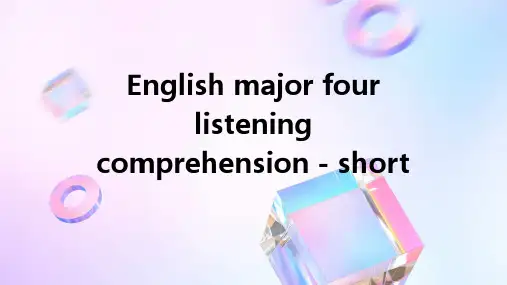
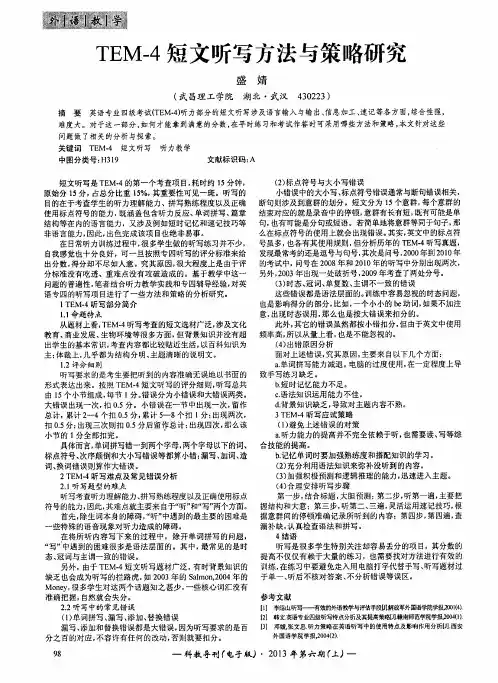
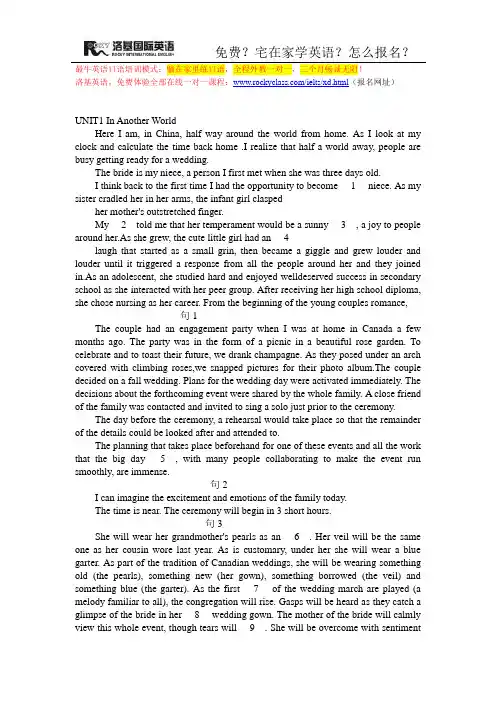
最牛英语口语培训模式:躺在家里练口语,全程外教一对一,三个月畅谈无阻!洛基英语,免费体验全部在线一对一课程:/ielts/xd.html(报名网址)UNIT1 In Another WorldHere I am, in China, half way around the world from home. As I look at my clock and calculate the time back home .I realize that half a world away, people are busy getting ready for a wedding.The bride is my niece, a person I first met when she was three days old.I think back to the first time I had the opportunity to become __1__ niece. As my sister cradled her in her arms, the infant girl claspedher mother's outstretched finger.My __2__told me that her temperament would be a sunny __3__, a joy to people around her.As she grew, the cute little girl had an __4__laugh that started as a small grin, then became a giggle and grew louder and louder until it triggered a response from all the people around her and they joined in.As an adolescent, she studied hard and enjoyed welldeserved success in secondary school as she interacted with her peer group. After receiving her high school diploma, she chose nursing as her career. From the beginning of the young couples romance, _________________句1___________________The couple had an engagement party when I was at home in Canada a few months ago. The party was in the form of a picnic in a beautiful rose garden. To celebrate and to toast their future, we drank champagne. As they posed under an arch covered with climbing roses,we snapped pictures for their photo album.The couple decided on a fall wedding. Plans for the wedding day were activated immediately. The decisions about the forthcoming event were shared by the whole family. A close friend of the family was contacted and invited to sing a solo just prior to the ceremony.The day before the ceremony, a rehearsal would take place so that the remainder of the details could be looked after and attended to.The planning that takes place beforehand for one of these events and all the work that the big day __5__, with many people collaborating to make the event run smoothly, are immense._______________________句2____________________I can imagine the excitement and emotions of the family today.The time is near. The ceremony will begin in 3 short hours.______________________句3_____________________She will wear her grandmother's pearls as an __6__. Her veil will be the same one as her cousin wore last year. As is customary, under her she will wear a blue garter. As part of the tradition of Canadian weddings, she will be wearing something old (the pearls), something new (her gown), something borrowed (the veil) and something blue (the garter). As the first __7__ of the wedding march are played (a melody familiar to all), the congregation will rise. Gasps will be heard as they catch a glimpse of the bride in her __8__ wedding gown. The mother of the bride will calmly view this whole event, though tears will __9__. She will be overcome with sentimentat her daughter's apparent happiness. The picture will be one that will __10__ hope for the future of humanity.生词讲解:1 be acquainted withl 与...相识They are acquainted with each other. 他们互相认识。
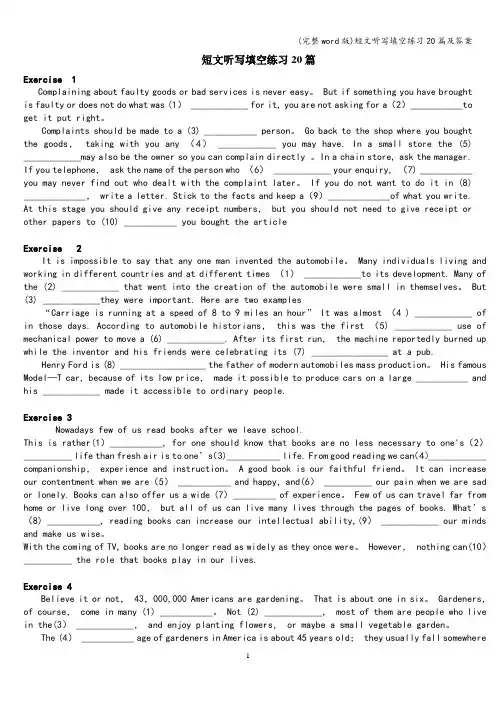
短文听写填空练习20篇Exercise 1Complaining about faulty goods or bad services is never easy。
But if something you have broughtis faulty or does not do what was (1) ____________ for it, you are not asking for a(2)___________to get it put right。
Complaints should be made to a (3) ___________ person。
Go back to the shop where you bought the goods, taking with you any (4) ____________ you may have. In a small store the (5)____________may also be the owner so you can complain directly 。
In a chain store, ask the manager.If you telephone, ask the name of the person who (6) ____________ your enquiry, (7) ___________ you may never find out who dealt with the complaint later。
If you do not want to do it in (8)_____________, write a letter. Stick to the facts and keep a(9)_____________of what you write.At this stage you should give any receipt numbers, but you should not need to give receipt or other papers to (10) ___________ you bought the articleExercise 2It is impossible to say that any one man invented the automobile。
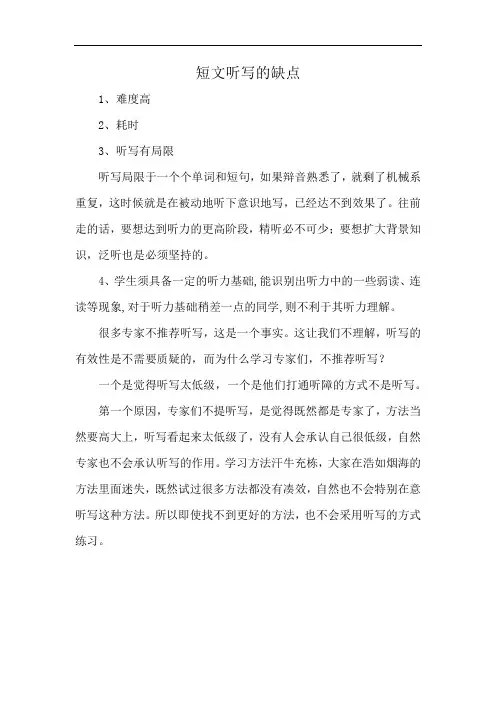
短文听写的缺点
1、难度高
2、耗时
3、听写有局限
听写局限于一个个单词和短句,如果辩音熟悉了,就剩了机械系重复,这时候就是在被动地听下意识地写,已经达不到效果了。
往前走的话,要想达到听力的更高阶段,精听必不可少;要想扩大背景知识,泛听也是必须坚持的。
4、学生须具备一定的听力基础,能识别出听力中的一些弱读、连读等现象,对于听力基础稍差一点的同学,则不利于其听力理解。
很多专家不推荐听写,这是一个事实。
这让我们不理解,听写的有效性是不需要质疑的,而为什么学习专家们,不推荐听写?
一个是觉得听写太低级,一个是他们打通听障的方式不是听写。
第一个原因,专家们不提听写,是觉得既然都是专家了,方法当然要高大上,听写看起来太低级了,没有人会承认自己很低级,自然专家也不会承认听写的作用。
学习方法汗牛充栋,大家在浩如烟海的方法里面迷失,既然试过很多方法都没有凑效,自然也不会特别在意听写这种方法。
所以即使找不到更好的方法,也不会采用听写的方式练习。
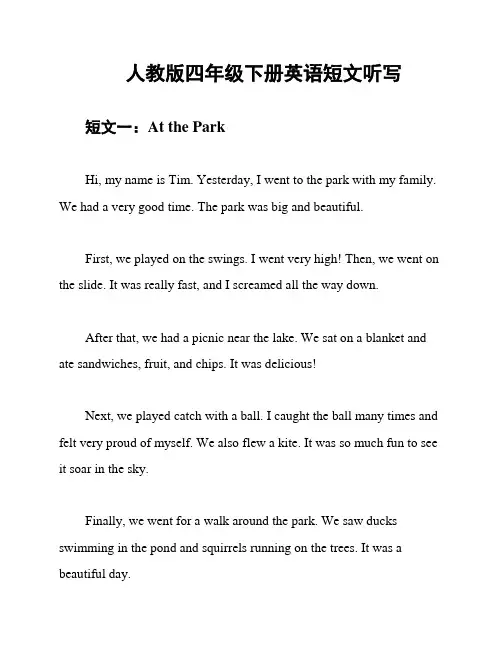
人教版四年级下册英语短文听写短文一:At the ParkHi, my name is Tim. Yesterday, I went to the park with my family. We had a very good time. The park was big and beautiful.First, we played on the swings. I went very high! Then, we went on the slide. It was really fast, and I screamed all the way down.After that, we had a picnic near the lake. We sat on a blanket and ate sandwiches, fruit, and chips. It was delicious!Next, we played catch with a ball. I caught the ball many times and felt very proud of myself. We also flew a kite. It was so much fun to see it soar in the sky.Finally, we went for a walk around the park. We saw ducks swimming in the pond and squirrels running on the trees. It was a beautiful day.I can't wait to go to the park again!短文二:My FamilyHello, my name is Jessie. I have a wonderful family. Let me tell you about them.My father's name is John. He is tall and strong. He works as a doctor in a hospital. He takes care of sick people and makes them feel better. I'm proud of him.My mother's name is Linda. She is beautiful and kind. She is a teacher at a primary school. She loves her students and teaches them many interesting things. I admire her.I have a younger sister named Emily. She is cute and funny. We play together every day. We sometimes argue, but we also love each other very much.We live in a big house with a garden. We have a pet dog named Max. He is friendly and playful.I love my family very much. They are always there for me and make me happy.短文三:Weekend ActivitiesHi, my name is Lucy. Let me tell you about my weekend activities.On Saturday morning, I usually help my mom clean the house. We dust the furniture, vacuum the carpets, and mop the floor. It's hard work, but it makes our home tidy and cozy.In the afternoon, I go to the library with my dad. I love reading books, especially adventure stories and mysteries. My dad helps me find interesting books, and we spend hours reading together.On Sunday, my family usually goes to the park. We have a picnic and play games. Sometimes, we even bring our bikes and go for a ride.It's so much fun!In the evening, I have art class. I enjoy drawing and painting. My teacher teaches me new techniques, and I get to express my creativity. I always feel proud of my artwork.After a busy weekend, I relax and get ready for the new week ahead.I look forward to more fun activities with my family next weekend.以上是人教版四年级下册英语短文听写,希望对你有帮助!。
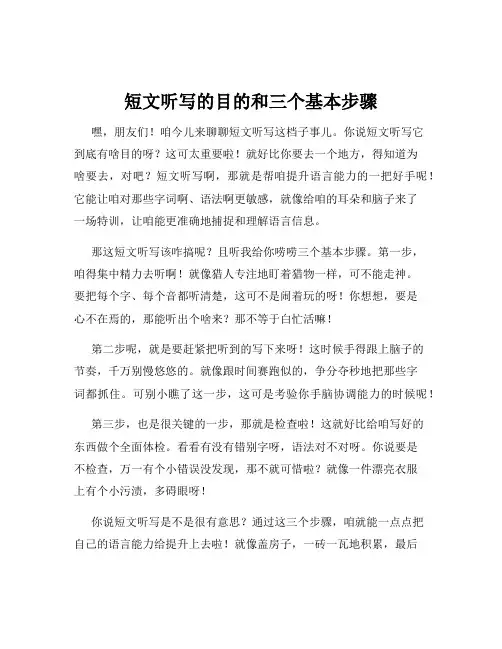
短文听写的目的和三个基本步骤嘿,朋友们!咱今儿来聊聊短文听写这档子事儿。
你说短文听写它
到底有啥目的呀?这可太重要啦!就好比你要去一个地方,得知道为
啥要去,对吧?短文听写啊,那就是帮咱提升语言能力的一把好手呢!它能让咱对那些字词啊、语法啊更敏感,就像给咱的耳朵和脑子来了
一场特训,让咱能更准确地捕捉和理解语言信息。
那这短文听写该咋搞呢?且听我给你唠唠三个基本步骤。
第一步,
咱得集中精力去听啊!就像猎人专注地盯着猎物一样,可不能走神。
要把每个字、每个音都听清楚,这可不是闹着玩的呀!你想想,要是
心不在焉的,那能听出个啥来?那不等于白忙活嘛!
第二步呢,就是要赶紧把听到的写下来呀!这时候手得跟上脑子的
节奏,千万别慢悠悠的。
就像跟时间赛跑似的,争分夺秒地把那些字
词都抓住。
可别小瞧了这一步,这可是考验你手脑协调能力的时候呢!
第三步,也是很关键的一步,那就是检查啦!这就好比给咱写好的
东西做个全面体检。
看看有没有错别字呀,语法对不对呀。
你说要是
不检查,万一有个小错误没发现,那不就可惜啦?就像一件漂亮衣服
上有个小污渍,多碍眼呀!
你说短文听写是不是很有意思?通过这三个步骤,咱就能一点点把
自己的语言能力给提升上去啦!就像盖房子,一砖一瓦地积累,最后
就能建成一座坚固又漂亮的大厦。
咱这语言能力的大厦也是这样呀,通过一次次的短文听写,让它越来越高,越来越稳。
所以呀,别小看了短文听写哦!它可是咱学习语言的得力助手呢!好好利用它,咱就能在语言的海洋里畅游无阻啦!大家都赶紧行动起来吧,让短文听写为咱的语言学习添砖加瓦!。
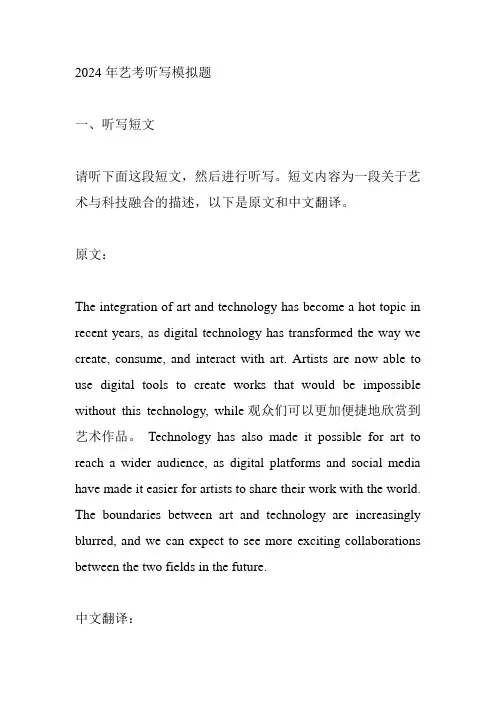
2024年艺考听写模拟题一、听写短文请听下面这段短文,然后进行听写。
短文内容为一段关于艺术与科技融合的描述,以下是原文和中文翻译。
原文:The integration of art and technology has become a hot topic in recent years, as digital technology has transformed the way we create, consume, and interact with art. Artists are now able to use digital tools to create works that would be impossible without this technology, while观众们可以更加便捷地欣赏到艺术作品。
Technology has also made it possible for art to reach a wider audience, as digital platforms and social media have made it easier for artists to share their work with the world. The boundaries between art and technology are increasingly blurred, and we can expect to see more exciting collaborations between the two fields in the future.中文翻译:近年来,艺术与技术的融合已成为热门话题,因为数字技术已经改变了我们创作、消费和与艺术互动的方式。
艺术家现在可以使用数字工具创作出没有这些技术就无法实现的作品,而观众可以更加方便地欣赏到艺术作品。
技术也让艺术能够触达更广泛的受众,因为数字平台和社交媒体使得艺术家能够更轻松地与全世界分享自己的作品。
六级听力短文听写第15堂短文听写做题要领掌握短文听写的做题要领,学会准确辨音、认真核查,提高听写的准确率。
短文听写要求所填内容既要在意思上要符合上下文的语境,也要在形式上符合该语境下的语法要求,这就需要我们在听音时要准确辨音,听音后要认真核查,掌握短文听写的做题要领,从而提高听写的正确率,减少不必要的失分。
一、注意音变现象英语中有很多音变现象,如连读、同化、弱读、失爆等,在听音时要注意辨别。
1连读连读是指语速加快时两个或多个分属不同单词的相邻音连在一起读出的语音现象。
连读是英语口语中最普遍、最重要的语音特征之一,也是学生在听力中所面临的较大难题之一。
六级听力中常见的连读有以下两种情况:辅音+元音第一个单词以辅音结尾、下一个单词以元音开头时,两个词连读。
如:held up, make a lot of sense, fix it right away等。
辅音+[h]音第一个单词以辅音结尾、下一个单词以清辅音[h]开头时,前一辅音将击穿清辅音[h],直接与[h]后的元音发生连读。
如:find himself,punish him,trained him等。
2同化同化是指语速加快时某些词连读造成语音相互影响而产生的语音变化。
同化既发生在词与词之间,也发生在词的内部,如:last year / l st /, education / ed ke n/。
1)融合同化融合同化是指前后两个音相互影响而融合成一个音,常见的有以下四种:如:not yet / n t et/; next year / nekst ///t/+/j/→/t //d/+/j/→/d/ 如:did you / d d u /; would you / wud u //z/+/j/→/ /如:because you /b k u /; seize you / si u //s/+/j/→// 如:advice you / d va u /; issue / u /如 /2)音变音变是指前一个词中的辅音受后一个词词首的辅音的影响而产生变化,常见的有以下三种:lz//n/→ / /在/k/, /g/前,如:in case / ke s/, ten girls / tep/, is she? / ///s/→ / /, /z/→ / /在/ /前,如:this ship //→ /θ/, /z/→ /s/, /v/→ /f/浊辅音和清辅音首尾相接时,浊音清化,如:with thanks /w ks/, has to /h s tu /, of course / f k s/弱读英语中有些非重读词(主要为助动词、系动词、介词、连词、冠词和人称代词等)有两种读音形式:强读式和弱读式。
The New York Times is an American daily newspaper, founded in N.Y. It has been (1) ________ published since September 18, 1851. It has won 112 Pulitzer Prizes, more than any other news organization. Its web site is America‟s most popular news site, receiving more than 30 million unique visitors per month.Following industry trends, its weekday circulation (2) ______________ fewer than one million daily since 1990. Nicknamed The Gray Lady, The Times is long regarded within the industry as a (3) ________ “newspapers of record”. The company‟s chairman is Arthur Ochs Sulzberger Jr., whose family has (4) ________ the paper since 1896.The paper‟s motto, “All the News That‟s Fit to Print”, appears in the (5) ________ left-hand corner of the front page. Its web site has (6) ________ it to “All the News That‟s Fit to Click”. It is (7) ______________ sections: News, Opinions, Business, Arts, Science, Sports, Style, Home, and Features. The New York Times stayed with the eight-column format for several years after most papers switched to six, and was one of the last newspapers to adopt color photography.In 1896, Adolph Ochs bought the New York Times, a money-losing newspaper, and formed the New York Times Company. The Ochs Sulzberger family, one of the United States‟newspaper dynasties, has owned The New York Times ever since Turner Catledge, the top editor at The New York Times for almost two (8) ________ , wanted to hide the ownership influence. Arthur Sulzberger routinely wrote memos to his editor, (9) ___________________, instructions, complaints, and orders. When Catledge would receive these memos he would erase the publisher‟s(10) ________ before passing them to his subordinates.Some of the arguments against bike share are jus t confusing. I don‟t know how to (1) ________ the argument that we don‟t need bike share because everyone who wants to bike already owns a bike. That‟s like saying that we don‟t need restaurants because everybody has a (2) ________. I don‟t know what to do with the argument that bike share stations take up valuable space on a public street. You know what is also taking up valuable space on a public street? Your car. My car.Now there are things I don‟t love about bike share. I‟m not (3) ________ about the idea of more people riding bikes with no helmets, which is probably because a few times I (4) ______________ a bike at high speed, hitting my head and cracking my helmet. Walking away with a cracked bike helmet makes you a very (5) ________ fan of bike helmets.And I also think cyclists need to (6) ______________. More than ever I am not going to lie: my first 10 years in New York City I probably stopped at four red lights. These days, however, you come to intersections and you find a half-dozen people stopped at a red light. That kind of peer (7) ________ is both strange and unbelievable.I think cyclists need to think of themselves as part of a bigger (8) ________ picture. But I think this is working. I think the more people that are on bikes, the safer streets become for everyone, and statistics (9) _____________ — risk of serious injury (10) ________ for both cyclists and walkers.Women are half the world‟s population. But they can face (1) ________ to economic independence and security. Today we hear about a program aimed at (2) ________ low cost loans to women in India. We also examine the Roman Catholic (3) ________ about efforts to permit church women. But first, we learn about women peacekeepers in the Middle East.Along the border of Israel and Lebanon, female peacekeeping troops are active in the United Nations force that guards the area. Avi Arditti tells us more. The captain is a medical (4) ________ and one of about 30 women who live on this French base of 700 peacekeepers. They help to keep the border secure and (5) ________ the Lebanese government. Captain Annie, French soldiers don‟t use their last names, says she does not (6) ________ herself a …female‟ peacekeeper, but a member of the UN force. But she says being a woman does sometimes help.United Nations Interim Force In Lebanon (UNIFIL) has a peacekeeping force of more than 11,000 troops in southern Lebanon. They come from 37 countries. In recent years, the United Nations has begun expanding women (7) _____________. Women in UNIFIL serve on both the common man and military forces, form helping with military planning to teaching French to Lebanese school children. Male and female peacekeepers live together, work together and play sports together. Force commander Eric of the French corps says women help to bring security to an insecure area. In southern Lebanon, many people (8)_____________about the roles of the sexes. But, UNIFIL‟s female peacekeepers say they (9)_____________ with the local community — men and women (10) ________.Until the nineteen sixties, black people in many parts of the United States did not have the same civil rights as white people. Laws in the American South kept the two (1)_________ separate. These laws forced black people to (2) _________ separate schools, and sit in separate areas on a bus. One day an old black woman got on a city bus. The law (3)_________black people seated in one area of the bus to give up their seats to white people. The woman refused to do this and was (4) ________________.This act of peaceful disobedience started (5) _________ in Montgomery that led to legal changes in (6) _________ rights in the United States. The woman who started it was Rosa Parks. She worked (7) _________ clothes from the nineteen thirties until 1955. Then she became a (8) ________________ for millions of African-Americans.In much of the American South in the 1950s, the first rows of seats were for white people only. Black people sat in the back of the bus. However, black people sitting in that part (9) ________________ leave their seats if a white person wanted it.Rosa Parks and three other black people were seated in the middle area of the bus when a white person got on the bus and wanted a seat. The bus driver (10) _________that all four black people get out of their seats so the white person would not have to sit next to any of them. The three other blacks got up, but Missus Parks refused. She was arrested.Cecil Blount DeMille was born in Ashfield, Massachusetts. Both his parents were writers of plays. His father died when he was twelve years old. His mother kept the family together by (1) _________ a theater company. Cecil joined the company as an actor. He continued working in his mo ther‟s theater company as an actor and a manager until 1913.That year, he joined Jesse L. Lasky and Samuel Goldfish to (2) _________ the Jesse L. Lasky Feature Play Company. Goldfish later changed his name to Samuel Goldwyn. The three men started making motion pictures (3) ________________. They were (4) _________ interested in its creative and financial possibilities. DeMille, Lasky and Goldfish began working on a movie (5) _________ of the popular American western play “Squaw Man”.DeMille (6) _________that the movie be made in the real American West. He chose Flagstaff, Arizona. DeMille and the company traveled to Flagstaff by train. When they arrived, DeMille thought the area looked too modern. They were in a quiet little town in southern California. The town was called Hollywood. DeMille decided this was the (7) _________ place to film the movie.“Squaw Man” was one of the first (8) ________________ produced in Hollywood. It was released in 1913 and was (9) ________________. DeMille is considered the man who helped Hollywood become the center of the motion picture business. He quickly became a creative force in the new movie industry. Cecil was among the very few filmmakers in Hollywood whose name appeared above the title of his movie. His name was more important to movie-goers than the names of the stars and his movies were known to be big (10) _________.In the beginning of the twentieth century, women like Isadora Duncan and Ruth Saint Denis wanted to create a new form of dance. Duncan and Saint Denis felt (1) __________ by ballet.Martha Graham was one of the most famous dancers and creators of dance, called choreographers(编舞者). She brought modern dance to a new level of (2) __________ in American culture. She created a new language of movement that expressed powerful emotions. She started traditions that are still used in modern dance today. They include expressive movements of the body to tell a (3) __________ story, special music, lighting, stage design and (4) __________.Martha Graham was born in the small town of Allegheny, Pennsylvania in 1894. After Martha turned fourteen years old, her family moved to Santa Barbara, California. While (5) ____________________ the Midwest, Martha enjoyed the wide, open spaces of nature. She also enjoyed the beautiful flowers and plants in California. The free, expressive movements of modern dance were (6) ___________________ the beauty of nature Graham observed.Earlier in her life, however, Martha did not know that she would become a dancer. Her father was a doctor and her family was very (7) __________ . They were members of (8) ____________________ and did not accept dance as an art (9) __________.Still, in 1910, Martha‟s father took her to see a dance (10) __________ by Ruth Saint Denis, one of the first modern dancers in America. Martha was sixteen and she decided then that she wanted to become a dancer.Are manners dead? Cell phones and social networking may be killing off the traditional politeness and good (1) __________ ,but a new generation of etiquette(礼节) experts is rising to make old-fashioned manners (2) __________ to a new generation. Their goal: to help young people (3) __________ troublesome, tech-age minefields, like invites on social networking sites and online dating, not to mention actual face-to-face (4) __________ with people.Perhaps the fastest growing area of social advice is what‟s been termed “netiquette”. There are online (5) __________ on using emotions in business e-mails, being careful when posting on social networks and re-posting too many micro blog messages.Young people “are (6) ____________________ the irony and rudeness that is so popular in their online lives”, said Jane Pratt, editor in chief of XoJane, a women‟s lifestyle web site. “The return of etiquette is in part a response to the harshness of the interactions they are having in the digital sphere.” The social puzzlement seems to be (7) __________. Are you required to respond to party invitations on Sina Weibo? Is it rude to listen to your iPod while (8) _________________ with someone else?When Daniel Post Senning, the great grandson of Emily Post, a well-known etiquette writer in the US, was working on the 18th edition of Emily Post‟s Etiquette, he found it impossible to cover technology in (9) _________________ . Instead, he (10) __________ an entire book to it, Emily Post‟s Manners in a Digital World: Living Well Online.It‟s called “Shanghai‟s 3rd Annual Love and Marriage Expo”. But the (1) __________ at this vast gathering for single Chinese men and women was (2) __________ unromantic. More than 18,000 people preregistered for the weekend event, (3) __________ in an expanding shopping complex specializing in home and office (4) __________.The crowds were met by billboards (5) _________________ thousands of single men and women — one list in pink and the other in blue. Within minutes of the doors opening on a rainy Saturday morning, visitors hurried to study the lists and take in (6) __________ information about potential candidates — age, height, education, annual income and their registered hometown, also known as hukou.Some people took notes, while others took photos of single entries with their cell phones. In one hall more than a hundred men and women in their twenties and thirties sat (7) __________ each other at tables decorated with red and yellow tablecloths, the beautiful tones of a Norah Jones love song (8) _________________ from loudspeakers. “Welcome everybody to our 8-minute (9) _________________,” announced the master of ceremonies eventually. When the eight minutes was up, each dater was instructed to move on.” Male guests plea se move two seats to your left,” boomed the announcer. For some (10) __________, this was the first time they had ever been on a date. “It‟s useful … it‟s just like research,” said Yixin Bai, a 20-year-old man home for the summer holidays from a university in Canada.Mom always told us we‟d go blind if we read in the dark. Does scie nce (1) _________________? Jim Sheedy, a doctor of vision science and director of the Vision Performance Institute at Oregon‟s Pacific University, sets his sights on the (2) __________ . Turns out, our parents were wrong. “There is no reason to believe nor evidence to support that any long-term damage to the eyes or change to the eyes can be caused by reading in the dark,” Dr. Sheedy says. That is not to say that page-turning during the night won‟t lead to discomfort or (3) __________.The lack of light will cause the pupils(瞳孔) get wilder and opener, (4) _________________ a smaller depth of field — the distance between the nearest and (5) __________ object that the eye considers to be in focus. Dr. Sheedy says the added effort to change focus and the effort to change the angle of the lines of sight between the two eyes will (6) __________ make your eyes feel tired and your body spent.But, of course, that‟s often the object of reading (7) _________________. Dr. Sheedy says he (8) __________ his students that there isn‟t enough evidence to argue that what you do with your eyes leads to nearsightedness. No link to long-term damage has ever been conclusively (9) __________, says Dr. Sheedy. It‟s an old tale, a (10) __________ used by moms to get kids to go to sleep when they wanted them to, he says.Children‟s Day is recognized on various days in many places around the world, to honor children globally. It was first (1) __________ by the World Conference for the Well-being of Children in 1925 and then established universally in 1954 to protect children working long hours (2) _________________ and allow all children access to an education. The UN General Assembly recommended that all countries should establish a Univ ersal Children‟s Day on an (3) “__________” day.International Day for Protection of Children, (4) __________ in many countries as Children‟s Day on June 1 since 1950, was established by the Women‟s International Democratic Federation on its (5) __________ in Moscow (22 November 1949) and was (6) _________________ the former Soviet Union‟s“peace propaganda” policy.In the West, the whole country celebrates with cards, presents, special foods, parades, and other activities. Although schools (7) __________ open, children do not attend class and (8) _________________ homework. Students (9) __________ in a wide variety of activities to strengthen loyalty to their country, have fun, and take part in, and join youth organizations such as the Communist Youth League. Children‟s Day i s a time of celebration for Chinese youngsters. The occasion is marked by the Children‟s Day Celebration honoring (10) __________ students and by numerous parent-children activities sponsored by government and civic organizations. Thus, the day not only lets the kids become king for a day, but also helps to strengthen the bond between parents and their children.短文听写答案(1-10篇)Passage 1(1) continuously (2) has dropped to (3) national(4) controlled (5) upper (6) adapted(7) organized into (8) decades (9) each containing suggestions (10) identityPassage 2(1) handle (2) kitchen (3) crazy(4) have fallen off (5) loyal (6) behave themselves(7) pressure (8) transportation (9) bear that out(10) declinesPassage 3(1) barriers (2) providing (3) debate(4) specialist (5) assist (6) consider(7) in greater numbers (8) hold conservative ideas (9) get along well(10) alikePassage 4(1) races (2) attend (3) required(4) put in prison (5) protests (6) minority(7) sewing (8) representative of freedom (9) were expected to (10) demanded(1) establishing (2) form (3) without delay(4) deeply (5) version (6) urged(7) perfect (8) full-length works (9) an immediate success (10) productionsPassage 6(1) restricted (2) popularity (3) dramatic(4) costumes (5) traveling across (6) clearly influenced by (7) religious (8) the upper class (9) form(10) performancePassage 7(1) graces (2) relevant (3) handle(4) contact (5) guidelines (6) getting sick of (7) endless (8) sharing a ride (9) a single chapter (10) devotedPassage 8(1) atmosphere (2) decidedly (3) located(4) furniture (5) posting lists of (6) vital(7) facing (8) spilling out (9) speed-dating event (10) participantsPassage 9(1) back her up (2) truth (3) fatigue(4) resulting in (5) farthest (6) likely(7) under the cover (8) assures (9) shown(10) method(1) proclaimed (2) in dangerous circumstances (3) appropriate (4) observed (5) congress (6) strongly bound to (7) remain (8) are free of (9) participate (10) model。
英语专业四级听写50篇前言听写在英语专业四级统考中占有15%的比重,是考试的重要组成部分。
说起听写,正在准备和已经参加过英语专业四级考试的同学会说:"我能明白听写的内容,可写的时候就是跟不上!""短文大意我明白,可是有的语我不会写。
这只反映出了问题的两个方面。
一是听写速度不够快。
二是词汇量不够或词汇掌握得不够准确。
这些无疑是影响听写成绩的重要因素。
但是,这些不是问题的全部。
在从事听写教学及听写问卷过程中,很容易发现学生失分的具体问题:(1)没听懂,没听好,听写速度跟不上,写出的内容断断续续不连贯,学生因此大量失分;(2)有的词汇没听懂,拼写不够准确,这导致听写失分;(3)时态错误导致失分;(4)单复数不准确导致失分;(5)没有注意断句或专有名词,句子开头单词或专有名词错误使用大小写导致失分;(6)没有注意原文冠词的使用,书写时漏掉冠词导致失分;(7)没有注意单数第三人称形式导致失分;(8)没有注意单数复数名词的形式导致失分。
上述问题的产生有的是缺乏训练造成的,如书写速度跟不上。
有的则是语言基础较差造成的,如听力较差没有完全听懂或没有掌握好词汇。
而单复数、大小写、冠词漏写等则多是粗心大意造成的。
听写部分能提高吗?当然能!而且提高的空间很大。
笔者从事英语专业基础教学与研究,从一开始所带的教学班参加四级考试超过全国院校平均通过率28.2个百分点,超过全国专业外语院校平均通过率12.5个百分点开始,所带的教学班在全国英语专业④级统考中通过率始终ito%,平均成绩、优秀率始终名列前茅。
最近一次所带的教学班参加四级统考,又考出了很好的成绩,通过率超过全国院校平均水平26石个百分点,超过全国专业外语院校13.6个百分点,而且在十几个平行班中平均成绩是最高的,优秀人数也是最多的。
在四级考试中,听写一项的成绩也不例外,每次均位居第一,本项目满分15分,所带班级平均成绩能够达到14分。
英语六级听力的短文听写和复述技巧在英语六级听力考试中,短文听写和复述是考生们常常面临的挑战之一。
短文听写要求考生准确听写出所听到的一段短文,而复述则要求考生能够准确地复述所听到的短文内容。
下面将为大家介绍一些在英语六级听力中提高短文听写和复述能力的技巧。
一、提升听力技巧有效提升听力技巧是进行短文听写和复述的基础。
以下是一些可以帮助提高听力技巧的方法:1. 练习多样化的听力材料:在备考阶段,将注意力放在不同类型的听力材料上,包括新闻、讲座、对话等。
这样可以帮助考生熟悉各种语境和语速。
2. 多听英语广播和录音:通过听英语广播和录音,可以提高对不同口音和语速的理解能力。
可以选择一些英语广播或者优质的英语听力材料,进行反复听写和复述。
3. 学习常见的缩略语和俚语:在英语听力中,常常出现一些缩略语和俚语,了解和熟悉这些常见的缩略语和俚语可以提高听力的准确性。
二、短文听写技巧短文听写是英语六级听力考试中重要的一部分。
以下是一些在短文听写中提高准确性的技巧:1. 注意听力文本的关键词:在短文听写过程中,关注听力文本中的关键词,比如人名、地名、日期等。
这些关键词通常是答案的线索。
2. 注意听力文本的逻辑关系:听力文本中的逻辑关系对于准确理解和抓住主题很重要。
比如,讲述一个事件的先后顺序、因果关系等。
3. 练习听写数字和日期:英语中的数字和日期常常是考生容易听错的部分。
对于这些数字和日期,考生在备考期间应该重点练习。
三、复述技巧复述是英语六级听力考试中的另一个难点。
以下是一些提高复述能力的技巧:1. 理解整个短文:在复述之前,先要全面理解整个短文的内容,抓住主题和重点。
2. 提炼要点:在复述的过程中,需要将短文中的关键信息提炼出来。
可以通过对关键词进行标记或者记忆的方式来提取要点。
3. 练习复述不同类型的短文:可以选择不同类型的短文进行复述,并将重点放在复述的准确性和逻辑性上。
通过不断的练习,提升复述能力。
四、总结英语六级听力的短文听写和复述是考生们备考过程中需重点关注的部分。
短文听写训练技巧短文听写是一项有效提高听力和写作能力的训练活动。
通过听读完一段短文,然后尽量准确地将所听到的内容用文字表达出来,可以帮助我们提高听取和理解外语的能力,同时也锻炼了我们的写作能力。
下面是一些短文听写训练的技巧,希望能够对大家的学习有所帮助。
1. 集中注意力短文听写需要我们集中注意力,仔细倾听每一个音节和信息。
在开始听写之前,要保持冷静和专注的心态,避免心猿意马、思绪飘散。
在听的过程中,可以通过紧张注视听写的内容,同时保持平静的心态,提高注意力的集中程度。
2. 注意重点词汇在短文中,一些重要的词汇往往是关键信息,需要我们特别注意。
这些词汇可能是名词、动词或者形容词,在理解中起到了重要的作用。
当出现这些关键词汇时,我们应该特别留意,并在听写时将其准确地记录下来。
3. 抓住句子结构语言中的句子结构对于理解和记忆短文内容起着重要的作用。
在听写时,我们应该努力抓住句子的结构,理清句子之间的逻辑关系。
通过熟悉不同句型的结构特点,我们可以更好地理解短文并准确地转述。
4. 注意语法和拼写在听写时,要尽量准确地记录下语法和拼写。
正确的语法和拼写是表达清晰和易读的基础。
对于一些常见的语法错误和拼写错误,我们可以通过系统的语法学习和词汇积累来提高自己的写作能力。
5. 多听多练短文听写的技巧需要通过反复的练习来巩固和提高。
我们可以选择不同主题和难度的短文,进行多次听写练习。
通过反复练习,我们可以逐渐提高自己的听写能力,培养敏锐的听觉和准确的记录能力。
总结起来,短文听写训练是一项有效的学习方法,可以同时提高听力和写作能力。
通过集中注意力、注意重点词汇、抓住句子结构、注意语法和拼写以及多听多练,我们可以逐渐提高自己的短文听写能力。
希望以上的技巧和建议能够对大家的短文听写训练有所帮助。
(一)Time is, for the average American, of utmost importance. To the(1) visitor, Americans seem to be more concerned with getting things(2) ontime(according to a predetermined schedule) than they are with developing deep(3) . Schedules, for the American, are meant to be planned and then followed in the smallest detail.It may seem to you that most Americans are completely(4) by the little machines theywear on their wrists, cutting their discussions off (5) to make it to their next appointment on time.Americans’language is filled with(6) , giving a clear (7) of how much it is valued. Time is something to be”on”, to be “kept”,“filled””saved”,”wasted”,”gained””planned””given””made the most of”, even”killed”.The international visitor soon learns that it is considered very rude to be late- even by 10 minutes-for an(8) in America.Time is so valued in America, because by considering time to be important one can clearly achieve more than if one”wastes”time and doesn’t keep busy. This philosophy has proven its worth. It has enabled Americans to be extremely productive and (9) is highly valued in America. Many American proverbs stress the value of guarding time, using it wisely, and setting and working toward specific goals. Americans believe in spending their time and energy today so that the (10) of their labor may be enjoyed at a later time.(二)Our lives are woven together. As much as i enjoy my own company, i no longer imagine i can (1) a single day, much less all my life,(2) on my own. Even if i am (3) in the mountains, I am eating food someone else has grown, living in a house someone else has built, wearing clothes someone else has sewn from cloth woven by others, (4) someone else(5) to my house. (6) iseverywhere. We are on this journey together. As i was growing up, i remember(7) that indepence not interdependence was everything. “Make you own way”, “Stand on your own feet”, or my mother’s favorite remark when i was face-to-face with (8) of some action:”Now that you’ve made your bed, lie on it!”Total independence is a dominant theme in our culture, I imagine that what my parents were tryingto teach me was to take (9) for my actions and my choices.But the teaching was shaped by our cultural images, and instead i grew up believing that I was supposed to be totally “independent”and consequently became very (10) to ask for help. I would do almost everything not to be a burden and not require and help from anybody.(三)Psychologists are finding that hope plays a (1) in giving people a measurable advantage and diverseas academic achievement, bearing up in tough jobsand coping with tragic illness. And,(2) the loss of hope is turing out to be a stronger sign that a person may (3) than other factors long thought to be more likely risks.“Hope has proven a powerful predictor of outcomein every study we’ve done so far,”said Dr. Charles R. Snyder, a psychologist who (4) a scale to assess how much hope a person has.For example, in research with 3,920 college students, Dr. Snyder and his (5) found that the level of hope among freshmen at the beginning of their first semester was a more(6) predictor of their college grades than were their S.A.T scores or their grade point averages in high school, the two measures most commonly used to predict college performance.“Students with high hope set themselves higher goals and know how to work to(7) them.”Dr. Snyder said. “When you compare students ofequivalent intelligence and past academic achievements, what sets them apart is hope.”In devising a way to assess hope scientifically, Dr. Snyder went beyond the simple notion that hope is (8) the sense that everything will turn out all right.”That notion is not (9) enough, and it blurs two key components of hope,”Dr.Snyder said. “Having hope means believing you have both the will and the way to (10) your goals, whatever they may be.”( 四)George Herbert Mead said that humans are talked into humanity. He meant that we gain personal identity as we communicate with others. In the earliest years of our lives, our parents tell us who we are. “You are (1) .”“You’re so strong.”We first see ourselves through the eyes of others, so their messages form important(2) . Later we interact with teachers, friends, romantic partners, and co-workers who communicate theirviews of us. Thus, how we see ourselves (3) the views of us that others communicate.The(4) connection between identity and communication is (5) evident in children who (6) human contact. Case studies of children who were isolated from others reveal that they lack a firm self-concept, and their mental and psychological development is severely hindered by lack of language.Communication with others not only affects our sense of (7) but also directly influences ourphysical and emotional well-being. Consistently, research shows that communicating with others promotes health, whereas social isolation(8) stress, disease, and early death. People who lack close friends have greater levels of anxiety and depression than people who are close to others. A group of researchers reveal scores of studies that trace the relationship between health and interaction with others. The conclusion was that social isolation is (9) as dangerous as high blood pressure, smoking and obesity. Many doctors and researchersbelieve that loneliness harms the immune system, making us more(10) to a range of miner and major illness.。